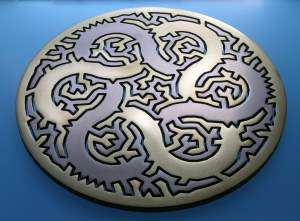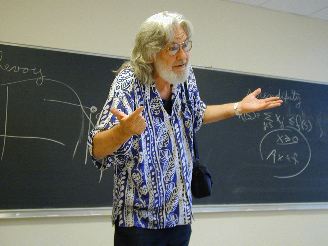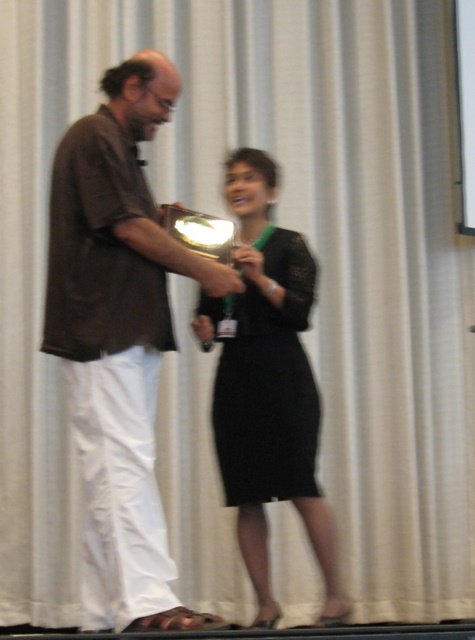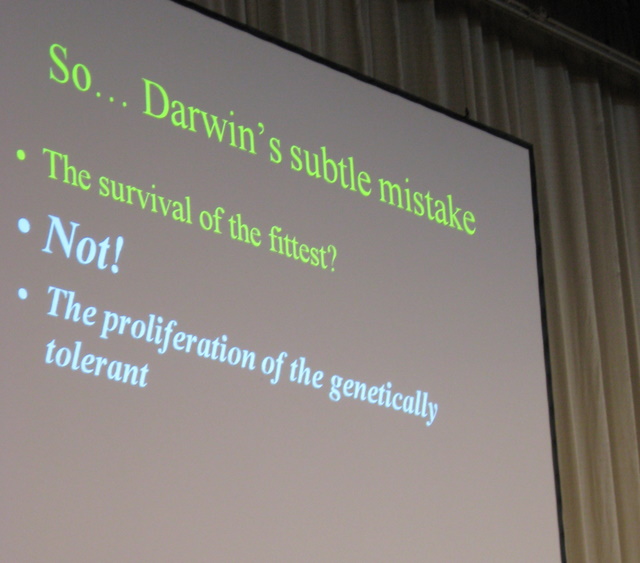 My friend and co-author Bob Bosch was awarded First Prize in the Mathematical Art Exhibition held by the American Mathematical Society. This work was based on the Traveling Salesman Problem:
My friend and co-author Bob Bosch was awarded First Prize in the Mathematical Art Exhibition held by the American Mathematical Society. This work was based on the Traveling Salesman Problem:
He describes his work in the exhibition catalog: “I began by converting a drawing of a two-component link into a symmetric collection of points. By treating the points as the cities of a Traveling Salesman Problem and adding constraints that forced the salesman’s tour to be symmetric, I constructed a symmetric simple-closed curve that divides the plane into two pieces: inside and outside. With a water jet cutter, I cut along this Jordan curve through quarter-inch thick, six-inch diameter disks of steel and brass. By swapping inside pieces I obtained two copies of the sculpture. Here, steel is inside and brass is outside… After I get an idea for a piece, I translate the idea into a mathematical optimization problem. I then solve the problem, render the solution, and see if I’m pleased with the result. If I am, I stop. If not, I revise the mathematical optimization problem, solve it, render its solution, and examine it. Often, I need to go through many iterations to end up with a piece that pleases me. I do this out of a love of mathematical optimization–the theory, the algorithms, the numerous applications.”
If you have a spare hour or two, be sure to check out the complete exhibition. Hmmm.. I have had some thoughts about translating my baseball schedules into Lego. I wonder if that could compete? Maybe not.
 I am the proud owner of two Boschs: I received a copy of a domino portrait of myself (I periodically use the portrait as my photo). I also have a spectacular traveling salesman art based on work by Warhol. If you visit my office, I have placed it so it is seen at the end of a long hallway. It is a conversation piece for all the hallway residents. You can get your own Bosch at Domino Artwork. There are also instructions for teachers who want to make a domino portrait of Barack Obama, Abe Lincoln, Martin Luther King, and others as classroom projects.
I am the proud owner of two Boschs: I received a copy of a domino portrait of myself (I periodically use the portrait as my photo). I also have a spectacular traveling salesman art based on work by Warhol. If you visit my office, I have placed it so it is seen at the end of a long hallway. It is a conversation piece for all the hallway residents. You can get your own Bosch at Domino Artwork. There are also instructions for teachers who want to make a domino portrait of Barack Obama, Abe Lincoln, Martin Luther King, and others as classroom projects.
Thanks to Twitter’s @wjcook (Georgia Tech’s TSP guru Bill Cook) for the pointer.

 You have to love a place with a Faculty of Mathematics and a 29 faculty strong Department of Combinatorics and Optimization. I was particularly attached to C&O and was inspired to enter the field of operations research due to the training I got there. I was strongly affected by two faculty members on the opposite sides of practically any spectrum. The first was Jack Edmonds, who founded combinatorial optimization with his work on matchings and his recognition of the key divide between polynomial and exponential algorithms. While that work was done in the 1960s, Jack has remained a prolific and influential researcher to this day. From Jack, I learned the beauty of this field.
You have to love a place with a Faculty of Mathematics and a 29 faculty strong Department of Combinatorics and Optimization. I was particularly attached to C&O and was inspired to enter the field of operations research due to the training I got there. I was strongly affected by two faculty members on the opposite sides of practically any spectrum. The first was Jack Edmonds, who founded combinatorial optimization with his work on matchings and his recognition of the key divide between polynomial and exponential algorithms. While that work was done in the 1960s, Jack has remained a prolific and influential researcher to this day. From Jack, I learned the beauty of this field. Christos Papadimitriou of UC Berkeley was the
Christos Papadimitriou of UC Berkeley was the  Christos’ fundamental point is that perhaps selection under recombination does not maximize fitness. Instead, it favors “mixability” (or genetic tolerance). And this mixability accelerates speciation, and accelerates evolution. There is a paper in the Proceedings of the National Academy of Science that explains this all in more detail.
Christos’ fundamental point is that perhaps selection under recombination does not maximize fitness. Instead, it favors “mixability” (or genetic tolerance). And this mixability accelerates speciation, and accelerates evolution. There is a paper in the Proceedings of the National Academy of Science that explains this all in more detail. I did get to the last half of Kelly’s talk. This was a very nice talk on modeling network routing, including issues of fairness. This happens a lot in internet routing of course, where routers try to figure out where things should go, and try to let everything through (eventually at least!). It would be rather annoying if one line through a router had a permanent “stop sign” while other traffic was sent through. Frank is famous enough to have a
I did get to the last half of Kelly’s talk. This was a very nice talk on modeling network routing, including issues of fairness. This happens a lot in internet routing of course, where routers try to figure out where things should go, and try to let everything through (eventually at least!). It would be rather annoying if one line through a router had a permanent “stop sign” while other traffic was sent through. Frank is famous enough to have a